Key takeaways:
- Weekly meal planning helps reduce stress and promotes creativity in meal preparation while fostering mindfulness in eating habits.
- Healthy eating impacts mood and energy levels, supports disease prevention, and builds community through shared meal preparation.
- Meal planning saves money and reduces food waste, providing more time for family and self-care while encouraging a balanced diet.
- Successful meal planning requires strategy, flexibility, and a focus on portion control, with an emphasis on simplicity to avoid burnout.
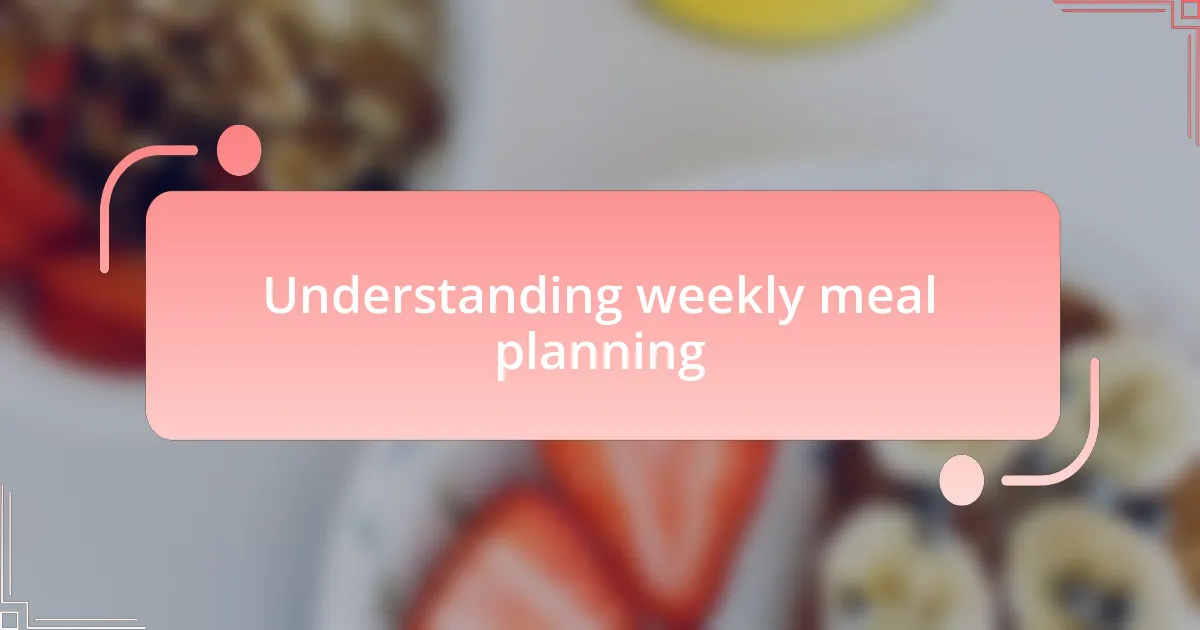
Understanding weekly meal planning
Weekly meal planning is an invaluable strategy that allows me to take control of my diet while minimizing stress during the busy week. I remember a time when I would often stand in front of the fridge, bewildered and starving, unsure of what to whip up for dinner. That chaotic feeling led me to embrace meal planning, transforming those frantic moments into an opportunity for creativity and organization.
When I sit down to plan my meals for the week, I not only consider what ingredients I have on hand but also how they make me feel. For instance, there’s something comforting about preparing a warm, hearty soup filled with vegetables after a long day. I ask myself, “What do I crave this week?” Tuning into my body’s needs helps me build a balanced meal plan that’s satisfying and nourishing.
For me, meal planning isn’t just about food; it’s a way to foster mindfulness in my eating habits. Each week, I take time to explore new recipes or revisit old favorites, and I find that this intentional approach deepens my appreciation for what I eat. Have you ever noticed how the simple act of planning can elevate your meals from mundane to magnificent? It’s about more than just keeping my kitchen stocked; it’s about cultivating a healthier, more enjoyable relationship with food.
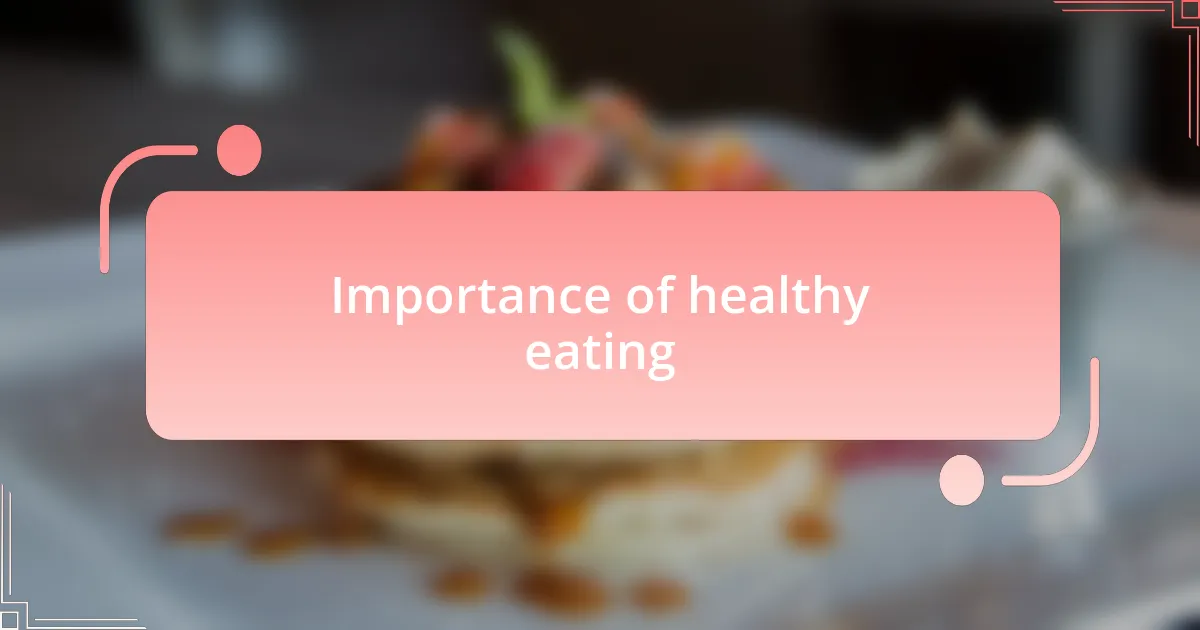
Importance of healthy eating
Healthy eating is essential as it fuels our bodies and shapes our overall well-being. I’ve noticed how what I eat directly impacts my mood and energy levels. When I choose vibrant, whole foods filled with nutrients, I feel lighter and more energetic, ready to tackle the day ahead. Have you ever felt the difference between indulging in processed snacks versus enjoying a fresh salad? The contrast is undeniable.
Moreover, developing healthy eating habits can help prevent chronic diseases. I once had a family member diagnosed with diabetes, and it was eye-opening to see how dietary choices played a pivotal role in managing their health. It reinforced my belief that our culinary decisions today can create a ripple effect for our future. Shouldn’t we prioritize foods that support longevity and vitality?
Also, healthy eating fosters a sense of community. I remember hosting meal prep sessions with friends, where we’d laugh, share recipes, and encourage each other on our health journeys. It’s incredible how food can bring people together, creating bonds while promoting wellness. Do you see meal preparation as a solitary task, or can it be a collective and enriching experience?
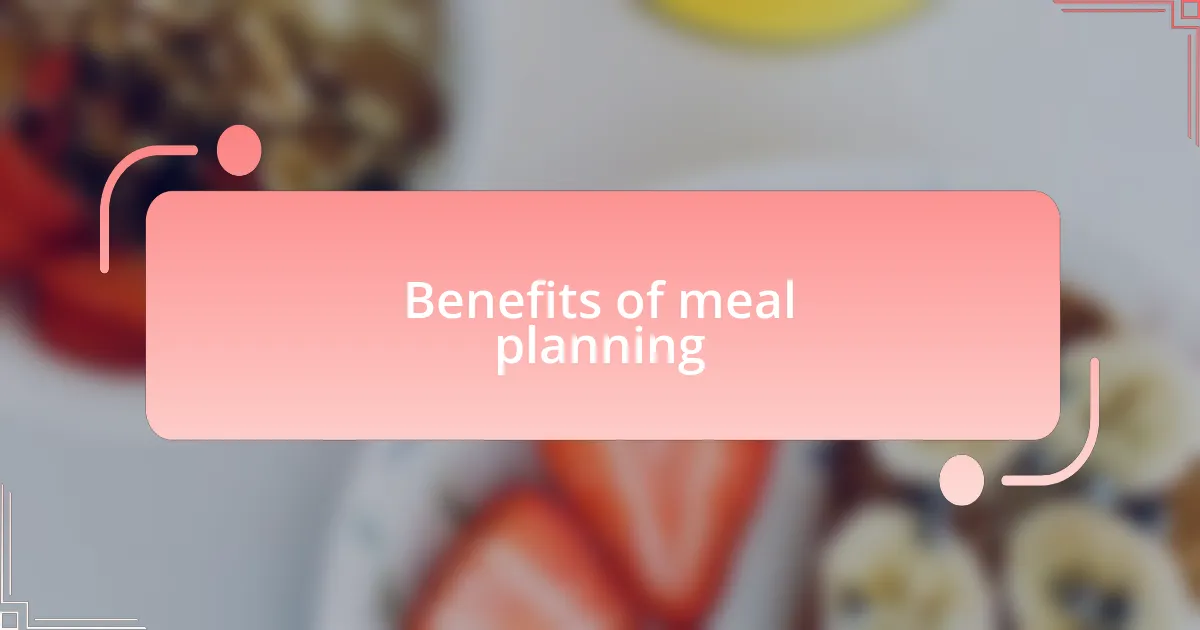
Benefits of meal planning
Meal planning offers a multitude of benefits that can transform your relationship with food. I’ve found that planning my meals ahead of time not only saves me money but also reduces food waste. How many times have you opened the fridge only to find spoiled ingredients you forgot about? By organizing my meals, I’ve drastically cut down on those wasted items, making me feel like I’m contributing positively to the environment.
Another remarkable benefit is the time it frees up during busy weeks. I can’t tell you how many evenings I used to stare blankly into the pantry, feeling overwhelmed by choices. Now, with my meals already planned, I enjoy a simple routine that allows me to focus on other priorities. It’s amazing how that small shift has granted me more quality time for my family and even self-care. Have you ever considered how much your evenings could improve with just a little foresight?
Nourishing my body with balanced meals becomes much easier when I plan ahead. I remember a time when I was constantly reaching for quick, unhealthy snacks due to poor planning, and I became sluggish and unfocused. Since incorporating meal planning, I’ve embraced a colorful array of nutrients that energize me throughout the day. Isn’t it fascinating how a little preparation can lead to a healthier lifestyle and more vibrant living?

My personal meal planning strategy
For my personal meal planning strategy, I start by dedicating a specific time each week to map out my meals. I often choose Sunday afternoons, making it a ritual that I look forward to while sipping my favorite herbal tea. During this time, I browse through recipes that excite me, jotting down ingredients I might need. I can’t help but feel a sense of accomplishment as I visualize the week ahead, each meal waiting to nourish me.
Once I outline the meals, I create a detailed shopping list to avoid those impulse-buying temptations at the grocery store. I remember one particularly chaotic week when I skipped this step and ended up with a cart full of snack foods instead of wholesome ingredients. That experience taught me how essential a clear plan was; now, I feel more empowered as a shopper, which positively impacts my overall eating habits.
One practice I cherish is preparing some ingredients in advance, like chopping vegetables or cooking grains. On particularly busy days, I can simply grab what I’ve prepped, which instills a sense of control over my nutrition. There’s something gratifying about knowing I’ve laid the groundwork for a healthy week ahead—don’t you agree that it feels rewarding to take charge of our food choices in such a tangible way?
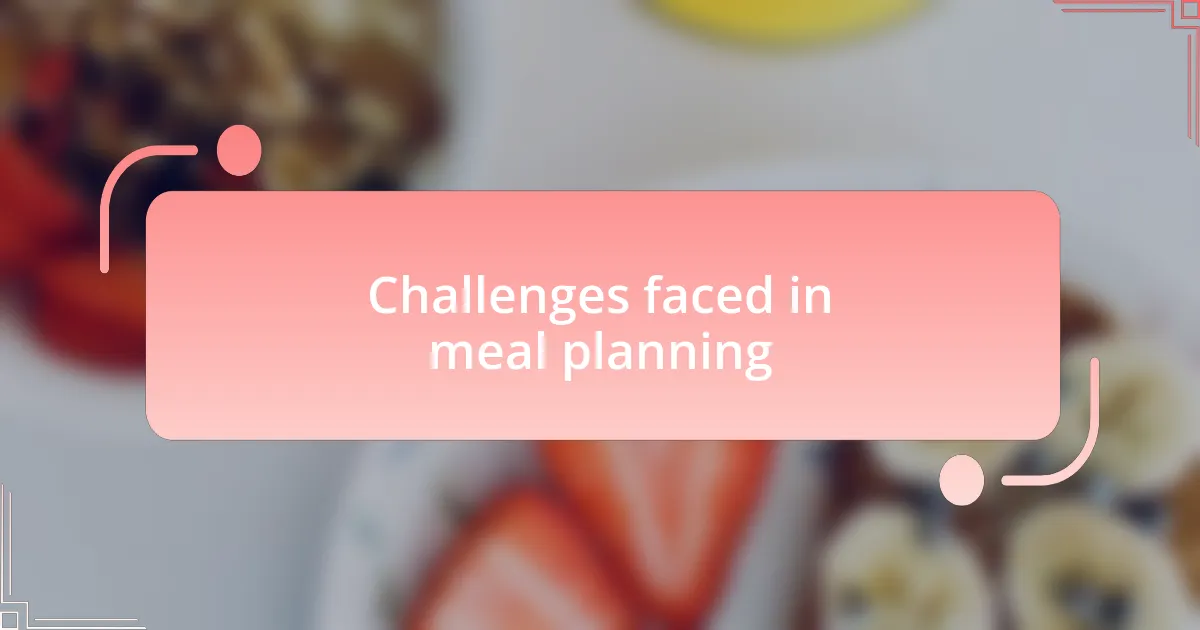
Challenges faced in meal planning
Meal planning can be a balancing act, and I often find myself grappling with the challenge of time management. There are weeks when my schedule gets unexpectedly packed, and I can’t dedicate the time I initially planned to meal prep. I remember one week when I had deadlines piling up, and meal planning took a backseat. As a result, I found myself resorting to quick but unhealthy options, which left me feeling sluggish and frustrated.
Another issue I face is the temptation to overcomplicate meals. In my eagerness to try new recipes, I’ve sometimes chosen dishes that require extensive preparation or hard-to-find ingredients. One time, I spent an entire afternoon on a complicated recipe that, while delicious, left me exhausted and with a messy kitchen. This taught me that simplicity and practicality are often the keys to successful meal planning.
Lastly, I struggle with keeping things interesting. It’s easy to fall into a rut where I end up repeating the same meals week after week. I remember a month where I had a rotation of just three dinners that I loved but soon began to dread. To combat this, I now allocate a slot each week for experimenting with one new recipe, making our meals something to look forward to rather than a chore. How do you keep variety alive in your meal planning while avoiding burnout?
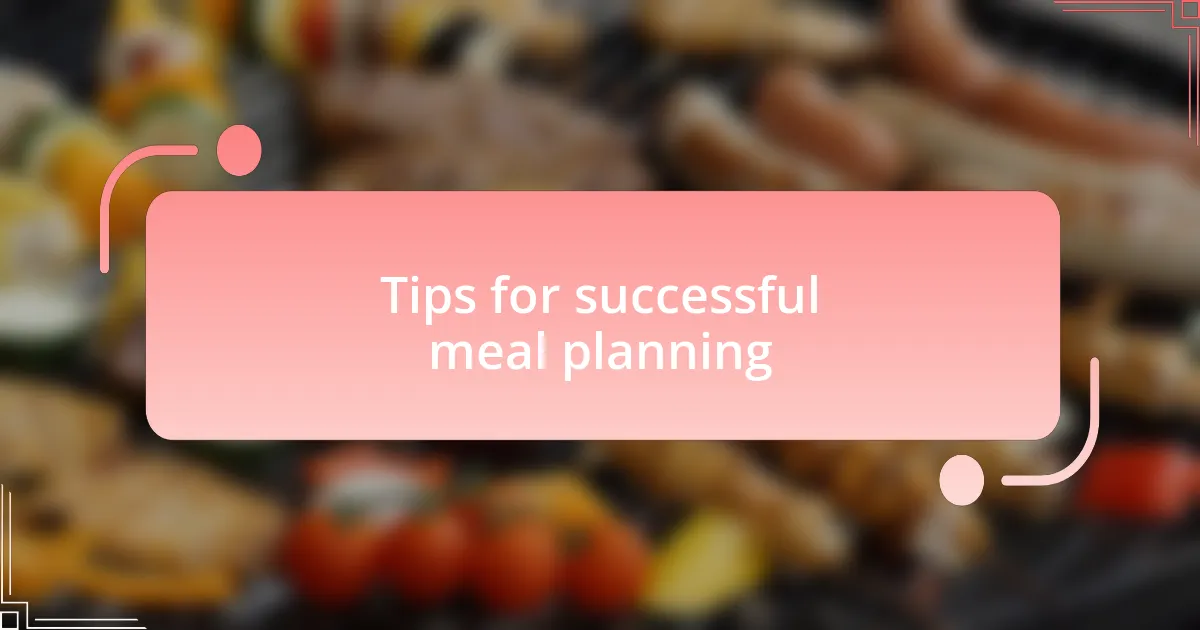
Tips for successful meal planning
Planning meals successfully requires a blend of strategy and flexibility. One tip I’ve found invaluable is to stick with what I know while slowly introducing new elements. For instance, I used to get overwhelmed with the number of recipes available online. Now, I focus on a few staple dishes I know my family enjoys, then swap in new ingredients or spices to keep things fresh. Has this helped me avoid the kitchen chaos? Absolutely.
Another aspect I have learned is the importance of portion control and having healthy snacks ready to go. I remember when I used to prepare large batches of meals, thinking I could save time later. But on those hectic days, it felt impossible to resist overeating. Now, I make smaller, more manageable portions, ensuring I have quick, healthy snacks available. This simple change has made a huge difference in how I feel throughout the day.
Lastly, I encourage setting aside dedicated time each week for meal planning. This is when I really connect with what I want to cook and reflect on my week. When I make it a ritual, I not only boost my weekly organization but also find joy in selecting ingredients and imagining the meals ahead. Have you ever felt inspired just by planning? I certainly have, and it creates a positive start to my cooking journey.